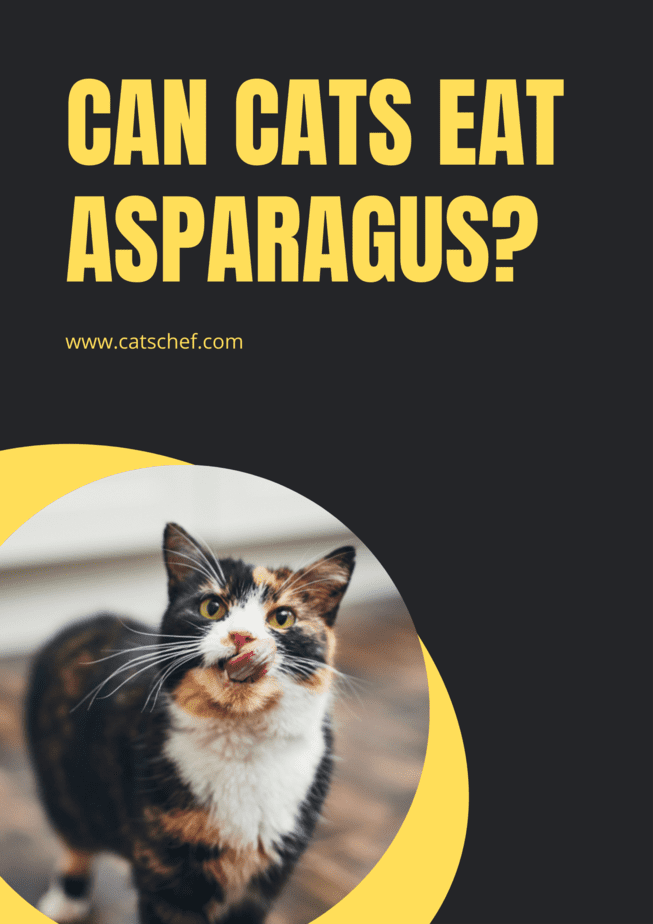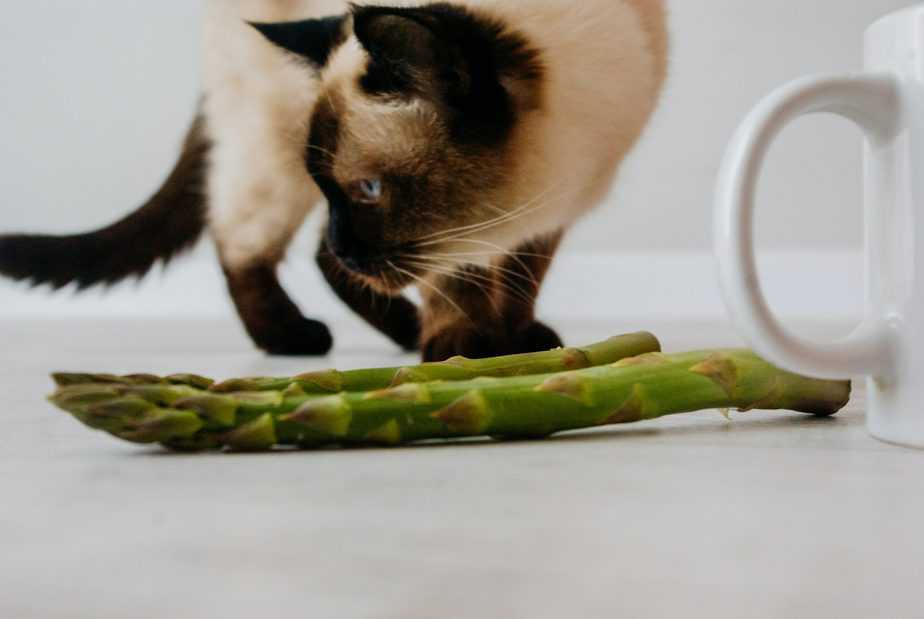Do you also have a feline inspector that needs to check out all of the ingredients you just bought? Well, I do, and that way, she tells me what she likes and dislikes. She does the same with veggies which poses the question of “Can cats eat asparagus“?
Vegetables are highly nutritional to humans and hold many beneficial ingredients such as vitamins, minerals, fiber, and others. Without them, our meals would be bland and colorless.
Vegetables, including asparagus, offer us a diversity of health benefits and fun when eating.
Have you ever noticed that some of the asparagus was missing from your vegetable shelf? Only one cunning thief may be blamed for this crime. What have those naughty, fluffy paws been up to?
The moment you realize your pet has stolen something you never gave her before, you start to wonder can cats eat asparagus without becoming sick?
It’s never a good idea to keep things hidden from cats; or, for that matter, a possible one. These crooks have honed their scavenging skills to high art. Finding out if cats can eat certain food safely is the best approach.
Can cats eat asparagus safely?
We can deduce that cats can eat asparagus because this veggie isn’t hazardous to them. As we all know, cats are born to consume meat. Therefore, asparagus isn’t advised as a staple in their diet. It’s not poisonous, but it doesn’t meet her nutritional requirements.
This vegetable is only suitable as a snack unless your cat is vegan (which she shouldn’t be). Asparagus is only allowed as a treat on rare occasions. Even if your cat seems to enjoy it, this veggie could be harmful to your cat’s health if not properly rationed.
There are plenty health benefits of asparagus, as well as some downsides to your cat eating these veggies. But let’s see if the pros outweigh the cons.
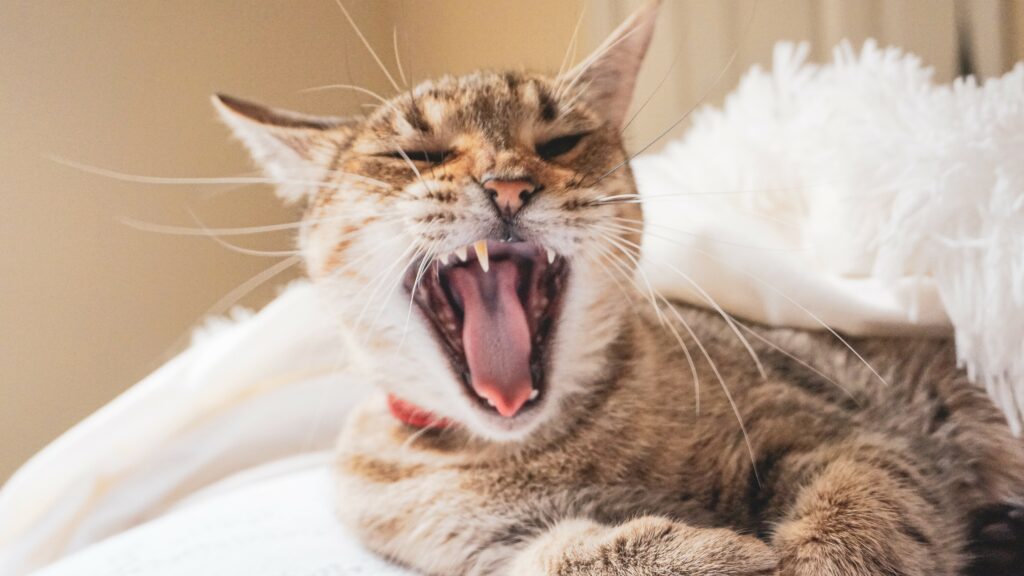
Health benefits of asparagus
The good news is that asparagus, besides being non-toxic to felines, is actually a supply of healthy supplements like fiber, vitamins, minerals, and protein. Apart from these, this vegetable is low in calories and fat which makes it a great snack for your furbaby.
If you’re looking for some greens to add to your cat’s diet, asparagus is a great option. It’s not only that cats can eat asparagus, but they should also snack on it from time to time.
Vegetables shouldn’t be one of the main ingredients on your cat’s list, but they can make a great part of their diet. Just like bell peppers, asparagus can provide a surplus of health benefits if consumed in moderation.
1. A source of vitamins
When it comes to your cat’s immune system, asparagus is an excellent supplement. It’s high in vitamin C, which helps boost the immune system. Her daily required intake can be met by eating small amounts of this veggie.
Vitamin C is necessary for metabolic activities and tissue growth, in addition to controlling the immune system. Asparagus’ health advantages may include reduced blood pressure.
This member of the lily family is also high in antioxidants, which aid in body protection from inflammation and disease.
Antioxidants have a crucial role in maintaining bone strength, assisting joints, and preventing cancer and arthritis, among other things. Vitamin C is also beneficial to cats since it modulates renal and urinary tract functioning.
If your furbaby suffers from respiratory issues, such as asthma, asparagus can assist. Collagen production is another advantage of vitamin C.
Collagen is responsible for making your fluff even fluffier! Her coat will be shiny, and she will shed less hair!
Vitamin A is another vitamin found in abundance in asparagus. This vitamin deficit might cause vision problems, and you don’t want that to happen to a nocturnal creature!
Aside from these advantages, this veggie contains vitamin E, which acts as an antioxidant. It works in tandem with vitamin K to prevent blood clots in arteries.
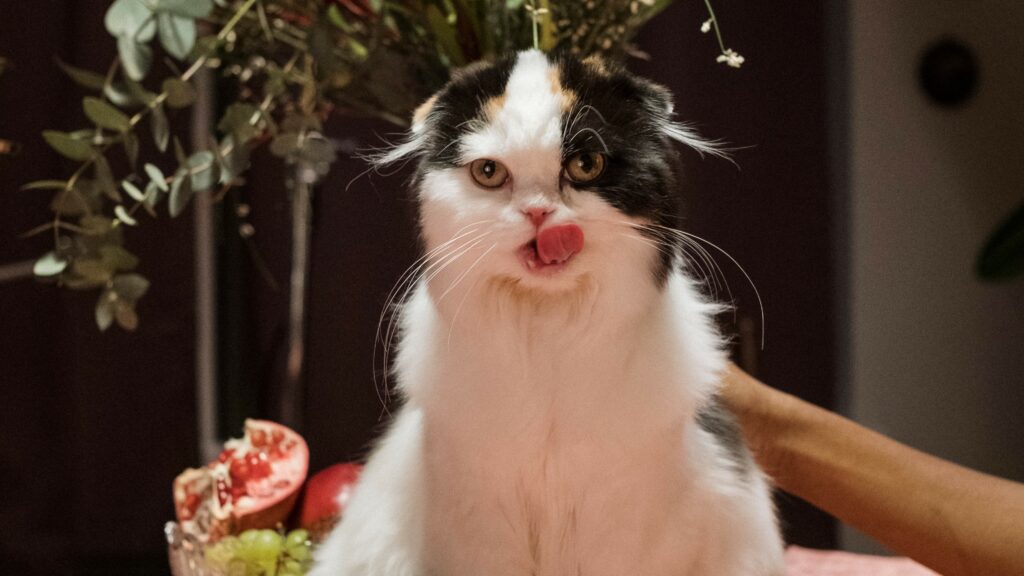
2. An abundance of minerals
Minerals are also an important component of these beneficial supplements.
Calcium, for example, aids bone development and strengthens your cat’s bones, teeth, and claws. Iron, on the other hand, aids in the formation of hemoglobin.
The folate minerals present in these veggies can help your cat metabolize proteins, so it’s a win-win situation. Deficiency of these two nutrients, which aid in the production of red blood cells, can lead to anemia.
Potassium is a vital element found in asparagus that helps muscles contract. If your cat enjoys this healthy snack, don’t stop her from eating it because it’s perfectly safe for her.
3. Protein and fiber
This green snack is high in vitamin C and antioxidants, and it can help with constipation. If your cat is suffering from digestive issues, the dietary fiber in the asparagus will assist.
If you have a chubby kitty, this digestive stimulation will also help them lose weight. Because of the high fiber content, a modest amount of this vegetable will fill her stomach. Aside from that, it’s is a low-calorie veggie!
Fiber also helps to keep cholesterol levels in check. And, as we all know, high cholesterol levels are a common cause of heart disease.
Other nutrients are beneficial, but protein is essential. Cats can’t develop and will become unwell rapidly if they don’t get enough protein.
Protein is thus the most vital nutrition for their bodies. Your pet can’t develop without protein, and if she doesn’t get enough of it, she will become ill.
The type of protein that’s beneficial to your pet is animal-derived protein. Other proteins generated from plant materials may be beneficial to your cat’s health, but they won’t be as effective as animal proteins.
Cats’ digestive systems aren’t designed to break down plant matter, so they have a hard time absorbing all of the nutrients. Fatty acids, amino acids, and vitamins contained in animal protein are not available in plant sources.
Still, cats can eat asparagus and it is a healthy snack to add to their diets. If she seems interested enough to give it a try, there’s no need in stopping her!

4. Lowers blood pressure
High blood pressure is a major risk factor for heart disease and stroke in cats all over the world. Increasing potassium intake while lowering salt intake appears to be an effective method to manage high blood pressure.
Potassium reduces blood pressure in two ways: by relaxing blood vessel walls and excreting excess salt in the urine. This superfood is a strong source of potassium, with a half-cup portion supplying 6% of your cat’s daily requirement.
Potassium is an important electrolyte in the body that’s required for muscle and nerve function. Hypokalemia is a term that describes a low potassium level in the blood. In sick cats, mild to moderate hypokalemia is rather common, but it rarely causes substantial clinical symptoms.
Severe hypokalemia, on the other hand, might result in serious and life-threatening clinical symptoms. Generalized muscular weakness is the most common symptom of severe hypokalemia.
5. Works as a natural diuretic
This funny-looking veggie can work as a natural diuretic, assisting the body in excreting excess salt and fluid. This makes it particularly beneficial to felines with high blood pressure. It also aids in the removal of toxins from the kidneys and the prevention of kidney stones.
Why are cats drawn to asparagus?
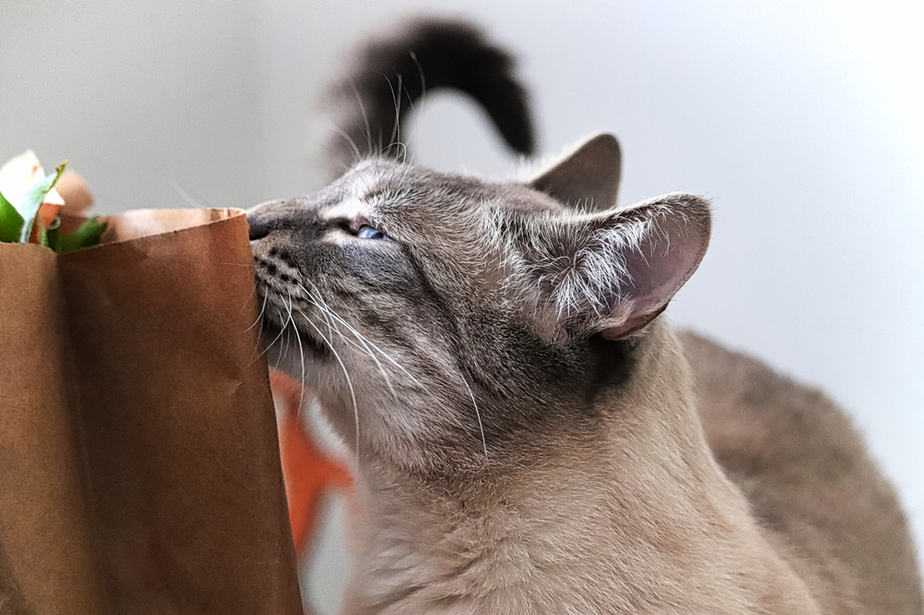
“Can cats eat asparagus? And why are they even drawn to this delicacy?”
If you’re a pet parent of a curious cat, this is one of the answers. Your cat is inquisitive, and she’s usually quite interested in what you’re up to. It’s also worth noting that, like many other animals, cats interact with the world through their lips.
They will feel the texture with their mouths, discover new smells and tastes. It’s also used to show love and affection!
As your cat tries to examine this new object in front of them, what starts out as a bite or a lick here and there, could turn into full-on snacking.
Besides the fact that this vegetable presents a novelty for your cat, she may be intrigued by its looks, crunch, and taste. Although they favor meat more and above anything else, a bit of refreshment in form of some veggies is often appreciated.
This vegetable may not be their first choice out in the wild, but it can serve to cure boredom in these highly active creatures. New experiences are important for felines, especially kittens that are just discovering the world.
Asparagus has a taste similar to broccoli. Many kids and some adults will strongly disagree on having it in their diets, but your furkid may just be the oddball!
Can cats eat asparagus stem?
The rest of the plant should be enough for your pet to snack away, so leave the stem at the bottom of the trash can. Asparagus stems are woody and hard to chew on. They’re not recommended for humans either.
Scale-like leaves are edible and a source of health benefits. So, a bit of asparagus leaves in the salad, raw or cooked, is a great snack.
Side effects of cats eating asparagus

Asparagus can induce flatulence, stomach cramps, and gastric discomfort in certain cats due to its high fiber content. It also includes asparagusic acid, which can break down into sulfurous chemicals, and give her urine a strange odor.
It could cause problems with their urine’s pH, which could lead to kidney stone formation, because asparagus is a highly alkaline vegetable. This could encourage the growth and spread of harmful germs in your cat’s bladder, leading to urinary tract infections.
Another risk of feeding asparagus to pets is that because it is a plant-based diet, it may irritate your cat’s stomach. Keep in mind that cats are obligate carnivores, with a digestive tract built to solely consume animal protein.
Asparagus may cause choking problems for your cat. This, however, is largely dependent on the size of the vegetable as well as the portion of the plant consumed by the cat. Cooked asparagus could be a safer option for your pet because it’s easier to chew on.
If you decide to cook some of this vegetable for your cat, make sure it’s unseasoned and without additional spices. These can be detrimental to your cat’s health and ruin her experience with this new food.
Asparagus allergy in cats
There are additional, allergic reaction concerns to be aware of. The symptoms of asparagus allergy in cats are similar to those of other allergies produced by plant-based foods.
Symptoms include gastrointestinal issues such as vomiting and diarrhea, trouble breathing, irritable behavior, and facial puffiness.
However, it’s a rare case of felines being allergic to this vegetable. Common foods that are more likely to cause an allergic reaction in felines are chicken, dairy, and grains.
Can cats eat asparagus on a daily basis?
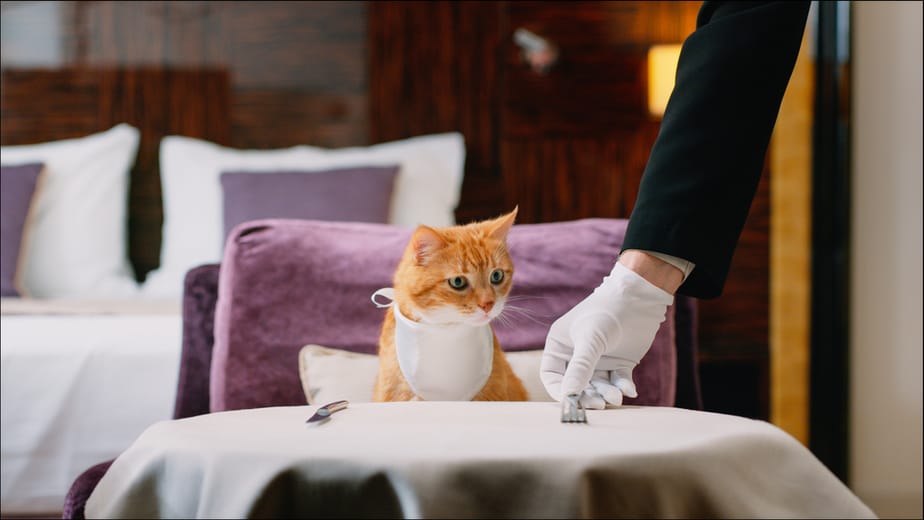
This vegetable has several health benefits, for both you and your four-legged companion. But cats shouldn’t consume it regularly. Even though it contains some protein, it’s still an insufficient supply of this nutrient.
Your feline’s daily need for protein can’t be quenched by asparagus. Although healthy, and a great addition to your pet’s bowl, you should monitor the consumption because of the possible side effects.
The amount of fiber found in asparagus can have an adverse effect if your cat goes crazy about it. While limited amounts can help with constipation, the opposite is ought to happen if she exceeds her allowance for this veggie.
Therefore, feed your cat with asparagus only as an occasional snack, cooked, and in bite-sized pieces.
Final thoughts
Cats can eat asparagus in moderation. It holds a surplus of health benefits for felines, such as vitamins, minerals, fiber, as well as protein. Besides, it’s low in fat and calories which reduces the risk of obesity and high levels of cholesterol.
It’s a great source of protein that cats can rely on to some extent, but this doesn’t mean you should replace her wet food with veggies. This green is full of antioxidants that help fight free radicals for your pet.
However, asparagus has a funny texture, and if your cat indulges in it without being cautious, there’s a risk of choking on it. Cooking this snack lowers the risk of it getting stuck in your cat’s throat.
Don’t forget to leave out seasonings and spices! Also, avoid the stem as it’s the woody part that’s hard to chew on and digest.
Asparagus is a great addition to your cat’s diet, but make sure this doesn’t happen on a daily basis. Stick to her meat-based diet and don’t even think about replacing it with veggies!
Up next: Can Cats Eat Green Beans? Do Cats Like These Greens?
